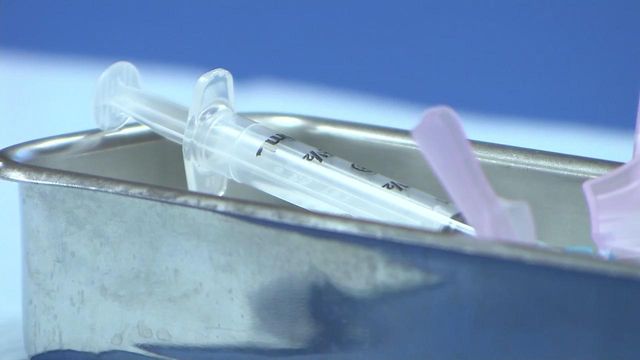In vaccine distribution, NC tries to address inequities in health care, COVID-19 cases, deaths
The state of North Carolina is sending vaccines to health centers in under-served communities, including two centers in Edgecombe County. While a lot of the centers are only getting 100 or 200 doses per week, it will help vaccinate more people in Black and brown communities. "You have infection rates in COVID-19 that are higher exponentially in black communities and poor communities, [Latinx] communities," says Reuben Blackwell, President and CEO of the OIC Family Medical Center in Rocky Mount, "You have mortality rates that are higher." Rueben says the pandemic has disproportionately affected Black families.
Posted — Updated"You have infection rates in COVID-19 that are higher exponentially in Black communities and poor communities, [Latinx] communities," says Reuben Blackwell, president and CEO of the OIC Family Medical Center in Rocky Mount. "You have mortality rates that are higher."
Blackwell says the pandemic has disproportionately affected Black families.
"Every month, since February 2020, in my network of people that I know, not just in Rocky Mount, but in my family, my friends, my community, my professional and social affiliation, I have known two to three people who have died a month. And the only strand that ties them together is that they were Black, and they died with COVID," he said.
The OIC Family Medical Center, like Carolina Family Health Centers, serves Black and Hispanic communities, as well as low-income families.
Blackwell says the problem in Edgecombe County, as in other parts of Eastern North Carolina, is that some residents lack access to the Internet or transportation. As many counties have relied on internet registration to allow those eligible to sign up for the vaccine, those in rural pockets are left behind.
"Every household doesn’t have Internet. It doesn’t have reliable Internet. People don’t have devices to access the Internet," Blackwell said.
Edgecombe County Manager Eric Evans says it’s important to work on vaccine distributions with health centers that already have trusted relationships with communities of color.
"Part of our strategy is to try to move from those typical centers of providing service that we have," says Evans, "[And] then be able to take it out further and deeper into the communities so people won’t have as far to go to get it if they want it."
Both OIC and the Carolina Family Health Centers are offering vaccination appointments. Carolina Family Health Centers, Inc. has locations in Wilson, Nash and Edgecombe counties.
“We have a diverse patient population, and by ensuring our patients have access to the vaccine, we are able to support the state’s efforts for equitable distribution and reaching historically marginalized populations," says Dr. Laura Owens, CEO of Carolina Family Health Centers, Inc.
Blackwell says a history of racial inequality in healthcare has bled into the pandemic, as well as the vaccination process, and there’s work to be done to get those communities the help they need.
"The legacy of that means people who are Black and poor, who live in these Eastern North Carolina counties, have less resources to work with — and it works out with higher rates of diabetes, higher rates of hypertension, more asthma with children, as well as lead poisoning and a multiple number of other disparities. And what COVID does is it exacerbates, and it attaches itself, and makes everything worse than it already was," he said.
Related Topics
• Credits
Copyright 2024 by Capitol Broadcasting Company. All rights reserved. This material may not be published, broadcast, rewritten or redistributed.






